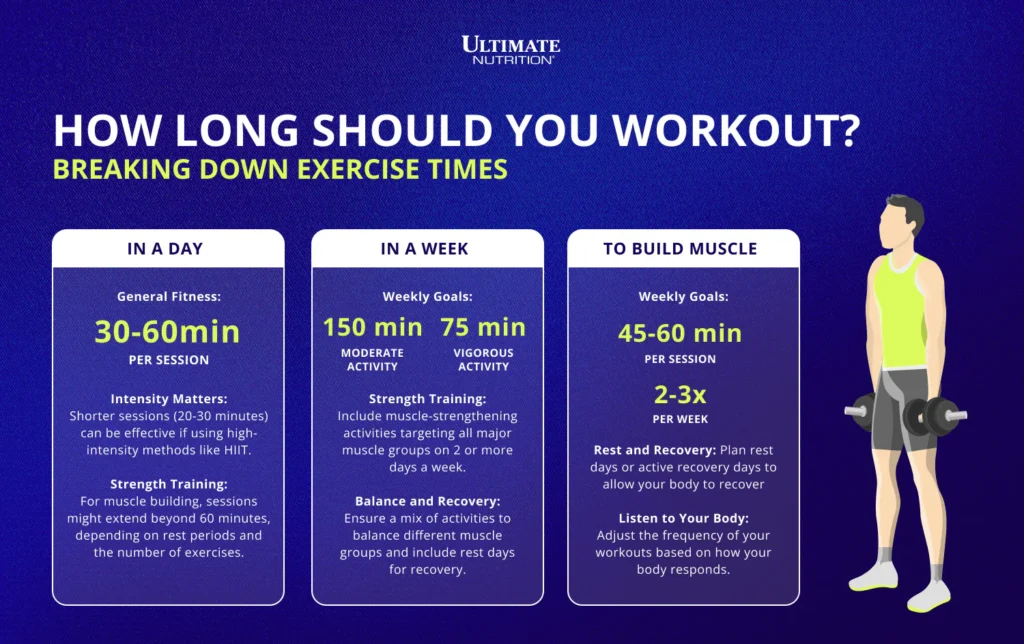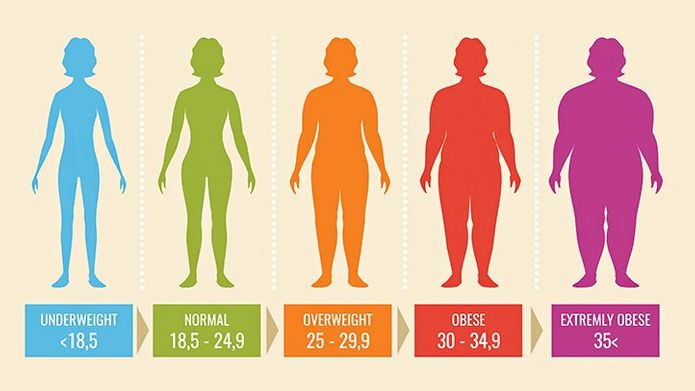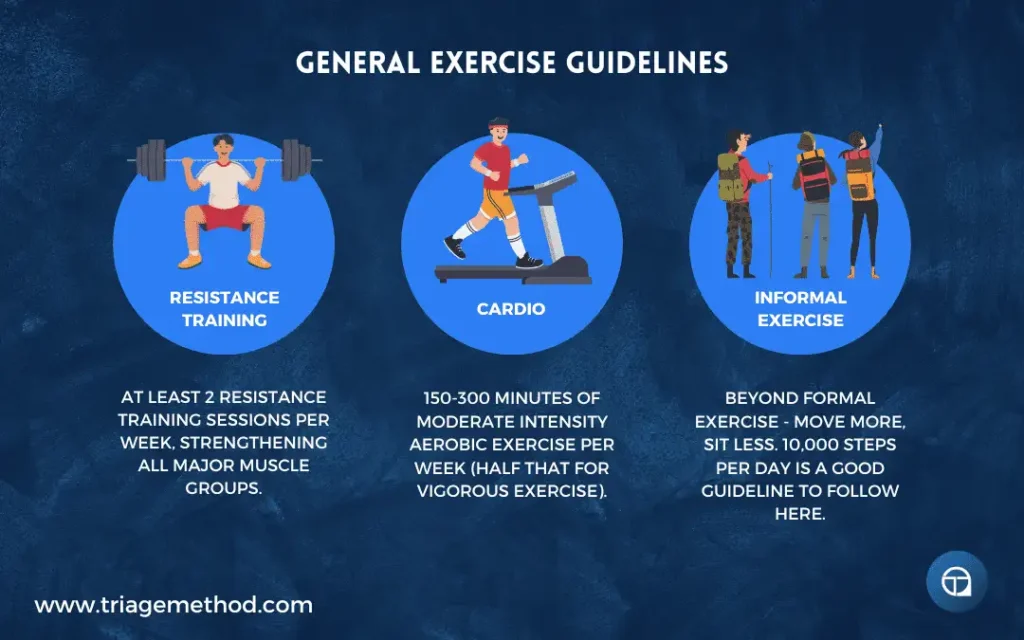To maintain health, aim for 150-300 minutes of moderate exercise or 75-150 minutes of vigorous exercise per week, combined with strength training twice a week.
In this article, we’ll cover the recommended amount of exercise per week, why it’s essential, and how different types of exercise benefit your body.
Importance of Regular Exercise:

Exercise is not just about losing weight or building muscle. It plays a crucial role in improving overall health. Regular physical activity helps with heart health, mental well-being, muscle strength, and even sleep quality. Knowing how much exercise to include in your routine ensures you’re giving your body the movement it needs.
Recommended Exercise Guidelines:
Experts like the World Health Organization (WHO) and the American Heart Association (AHA) provide clear exercise guidelines for adults. These recommendations help maintain good health through regular physical activity.
For Adults (18-64 years old):
- Moderate-Intensity Exercise: Aim for 150-300 minutes of moderate-intensity aerobic exercise per week, like brisk walking, cycling, or swimming.
- Vigorous-Intensity Exercise: Alternatively, aim for 75-150 minutes of vigorous-intensity activities such as running, aerobics, or fast cycling.
- Strength Training: Include muscle-strengthening exercises at least twice a week, using weights, resistance bands, or bodyweight exercises like push-ups.
Also Read: What Is Fitness – A Comprehensive Guide!
How to Meet the Weekly Exercise Target:
Meeting the recommended weekly exercise goal might seem daunting, but it becomes much easier when broken into smaller, more manageable sessions. By incorporating different strategies and activities, you can achieve your fitness targets without feeling overwhelmed. Here are a few practical tips to help you reach your exercise goals effectively.
Break It into Daily Sessions:

One of the easiest ways to meet your weekly exercise target is by breaking it down into daily chunks. Instead of trying to fit in long workouts, aim for shorter, more frequent sessions. For example, 30 minutes of moderate-intensity exercise, like brisk walking or cycling, five days a week can help you achieve the recommended 150 minutes.
This way, exercise becomes a part of your daily routine, and you won’t feel pressured to dedicate hours at a time.If you’re short on time, you can also split your workout into smaller sessions, such as 10-15 minutes of activity in the morning and another session later in the day. This approach makes it more flexible and easier to stick with over the long term.
Combine Different Activities:
Variety is key to staying motivated and enjoying your fitness routine. Instead of sticking to one type of exercise, try mixing different activities to keep things interesting and target different muscle groups. Combining aerobic exercises like walking or swimming with strength training and flexibility exercises like yoga or Pilates helps ensure a well-rounded workout.
Types of Exercise and Their Benefits:
Exercise is not one-size-fits-all; it comes in various forms, each offering unique advantages for your body and mind. Engaging in a variety of exercises ensures a well-rounded fitness routine that targets different aspects of your health. Here’s a breakdown of the key types of exercise and the specific benefits they bring.
Also Read: Is Working Out EveryDay Bad – Understanding the Risks and Benefits!
Aerobic Exercise (Cardio):
Aerobic exercises, commonly known as cardio, involve rhythmic activities that elevate your heart rate and improve cardiovascular endurance. Examples include walking, running, swimming, cycling, and dancing. These activities increase your body’s ability to transport and use oxygen efficiently, benefiting the heart, lungs, and circulatory system.
- Heart Health: Cardio exercises help lower blood pressure, reduce cholesterol levels, and decrease the risk of heart disease and stroke.
- Weight Management: By burning calories, aerobic exercises contribute to weight loss and help maintain a healthy body weight.
- Increased Stamina: Regular aerobic activity enhances endurance, allowing you to perform daily activities with more energy and less fatigue.
- Mood Boost: Cardio exercises trigger the release of endorphins, chemicals in the brain that help relieve stress, anxiety, and depression, leaving you feeling more positive and energized.
Incorporating 150-300 minutes of moderate-intensity or 75-150 minutes of vigorous-intensity aerobic exercise each week can significantly improve your overall health and fitness levels.
Flexibility and Balance:

Exercises like stretching, yoga, and tai chi improve flexibility and balance. These activities are especially important as you age, as they help prevent falls and injuries. Flexibility exercises improve mobility and ease tension in the body.
How Exercise Impacts Your Health:
Exercise is key to overall health, benefiting both body and mind. Regular activity can prevent chronic diseases, improve mental well-being, and enhance physical strength. Let’s explore how different exercises positively impact your health.
Heart Health:
Cardio exercises like walking, running, or cycling strengthen your heart, improve blood circulation, and lower blood pressure. These activities help reduce bad cholesterol and increase good cholesterol, significantly lowering the risk of heart disease and stroke.
Also Read:My Goal For Understanding Health And Wellness Is Balancing Exercise – A Complete Guide!
Mental Health:
Exercise boosts mental health by releasing endorphins, which reduce stress and anxiety. Regular physical activity improves mood, enhances mental clarity, and helps alleviate symptoms of depression, making it great for emotional well-being.
Weight Management:

Exercise helps burn calories and increases metabolism, aiding in weight loss or maintenance. Strength training builds muscle mass, which boosts calorie burning, while cardio activities help reduce body fat for overall weight management.
Better Sleep:
Exercise promotes better sleep by regulating your internal clock and improving sleep quality. It helps you fall asleep faster and stay asleep longer, but avoid intense workouts too close to bedtime to prevent restlessness.
Bone and Joint Health:
Weight-bearing exercises like walking, strength training, and yoga improve bone density and joint flexibility. These activities reduce the risk of osteoporosis and arthritis, keeping bones strong and joints healthy as you age.
Also Read: Should I Let Them Heal Doing Exercise – A Complete Guide!
Common Mistakes to Avoid in Your Exercise Routine:
While it’s great to stay active, there are a few common mistakes people make when trying to exercise. Avoiding these pitfalls can help you stay safe and get the most out of your workouts.
- Overtraining: It’s easy to think that more exercise is always better, but overtraining can lead to injury, fatigue, and burnout. Be sure to take rest days and allow your body time to recover between workouts.
- Skipping Warm-ups and Cool-downs: Warming up before exercise and cooling down afterward are essential for preventing injuries. Take a few minutes to stretch and gradually increase your heart rate before diving into more intense activities.
- Not Listening to Your Body: If you’re feeling pain or discomfort during exercise, it’s important to listen to your body. Don’t push through pain, as this can lead to injury. Adjust your workout intensity and consult a doctor if you have concerns.
General Exercise Recommendations:

To maintain good health, it’s important to follow general exercise guidelines that suit your age, fitness level, and goals. These recommendations provide a balanced approach to physical activity, ensuring a mix of aerobic and strength-training exercises for optimal health.
Adults (18-64 years old):
Adults should aim for 150-300 minutes of moderate-intensity aerobic exercise per week, such as brisk walking or swimming. Alternatively, 75-150 minutes of vigorous-intensity activities like running or cycling can be performed. Strength training exercises, such as lifting weights or bodyweight exercises, should also be included at least two days a week to improve muscle strength and endurance.
Older Adults (65+ years old):
For older adults, regular physical activity helps maintain mobility and balance. The goal remains 150 minutes of moderate-intensity aerobic exercise weekly, focusing on activities that enhance strength, balance, and flexibility. Older adults should also perform balance-improving exercises like yoga or Tai Chi to reduce the risk of falls.
Also Read: Is It Effective To Go To The Gym Every Day – Is It Effective or Risky!
Children and Adolescents (6-17 years old):
Children and teens should get at least 60 minutes of moderate to vigorous physical activity daily. This should include aerobic activities like running, playing sports, or swimming. Additionally, strength-building exercises like climbing or push-ups should be incorporated three times a week to support healthy development.
Pregnant and Postpartum Women:
Pregnant and postpartum women should aim for at least 150 minutes of moderate-intensity aerobic exercise weekly. Activities like walking, swimming, and prenatal yoga are ideal, promoting overall health and reducing pregnancy-related risks. It’s always recommended to consult a healthcare provider before starting or continuing an exercise routine during pregnancy.
FAQ’s
1. How much exercise is recommended for adults?
Adults should aim for 150-300 minutes of moderate exercise or 75-150 minutes of vigorous exercise weekly, plus strength training at least twice a week.
2. What types of exercise benefit heart health?
Cardiovascular exercises such as walking, running, or cycling enhance heart health by improving circulation and lowering blood pressure.
3. Can exercise improve mental health?
Yes, regular exercise increases endorphin levels, which help reduce stress and improve mood, clarity, and overall mental well-being.
4. How does exercise affect sleep?
Exercise helps regulate the body’s internal clock, enhancing sleep quality and enabling you to fall asleep more quickly.
5. Why is strength training important?
Strength training increases muscle mass, boosts metabolism, and supports the health of bones and joints, contributing to overall fitness.
Conclusion
In conclusion, regular exercise is vital for maintaining overall health and well-being. Adults should strive for 150-300 minutes of moderate or 75-150 minutes of vigorous exercise each week, alongside strength training twice a week. By incorporating a variety of physical activities, individuals can enhance heart health, mental clarity, and overall fitness, leading to a healthier lifestyle.